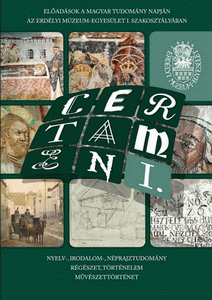Szabó T. Attila nyelvészeti írásai a két világháború közti Erdélyi Múzeumban
Szabó T. Attila’s Linguistical Studies in the Erdélyi Múzeum Between the Two World Wars
Author(s): András ZselykeSubject(s): Language and Literature Studies
Published by: Erdélyi Múzeum-Egyesület
Keywords: historical onomastics; toponymy; microtoponymy; collection of place-names; purism; standard usage
Summary/Abstract: Szabó T. Attila’s ramifying linguistical researches have a central and epoch-making undertaking: to compile, to uncover and to interpret the toponyms of Central and Upper Transylvania, on the level of the settlements. Compared to his historical linguistical and onomastical works, his puristic articles are considered to be of secondary importance in the groves of Academe, and maybe for this reason they are less present in the common knowledge, but as it will turn out in the second part of my paper, they fit in his linguistical writings organically, and they are worthy of getting acquainted with them. The linguist from Cluj and the experts gathering round, the so-called Cluj school pursues researches which’ novelty essentially consists in their program to combine historical toponymy and fieldwork regarding the spoken language. We can see the proceeds of this achievement on the columns of the Erdélyi Múzeum, subjecting Szabó T.’s onomastical studies to an examination. This view is reflected in Szabó T.’s numerous puristic articles, which started to appear in the transactions beginning with 1935. Besides that these results are valuable contributions to historical onomastics, our linguist perpetually feels a calling for solicitude about the present condition and function of our language, because the historical researches and those of questioning the parameters of the actual normative language are complementary operations.
Journal: Certamen
- Issue Year: 2013
- Issue No: I
- Page Range: 13-20
- Page Count: 8
- Language: Hungarian

